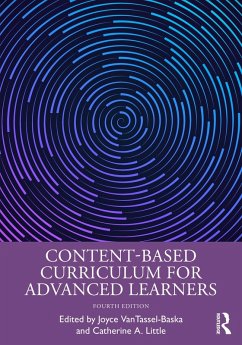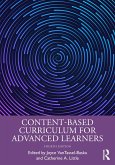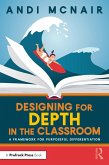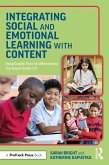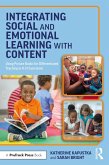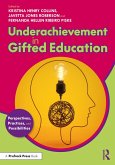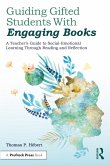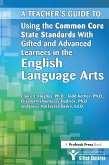Content-Based Curriculum for Advanced Learners (eBook, ePUB)
Redaktion: Vantassel-Baska, Joyce; Little, Catherine A.
73,95 €
73,95 €
inkl. MwSt.
Sofort per Download lieferbar

37 °P sammeln
73,95 €
Als Download kaufen

73,95 €
inkl. MwSt.
Sofort per Download lieferbar

37 °P sammeln
Jetzt verschenken
Alle Infos zum eBook verschenken
73,95 €
inkl. MwSt.
Sofort per Download lieferbar
Alle Infos zum eBook verschenken

37 °P sammeln
Content-Based Curriculum for Advanced Learners (eBook, ePUB)
Redaktion: Vantassel-Baska, Joyce; Little, Catherine A.
- Format: ePub
- Merkliste
- Auf die Merkliste
- Bewerten Bewerten
- Teilen
- Produkt teilen
- Produkterinnerung
- Produkterinnerung

Bitte loggen Sie sich zunächst in Ihr Kundenkonto ein oder registrieren Sie sich bei
bücher.de, um das eBook-Abo tolino select nutzen zu können.
Hier können Sie sich einloggen
Hier können Sie sich einloggen
Sie sind bereits eingeloggt. Klicken Sie auf 2. tolino select Abo, um fortzufahren.

Bitte loggen Sie sich zunächst in Ihr Kundenkonto ein oder registrieren Sie sich bei bücher.de, um das eBook-Abo tolino select nutzen zu können.
The fourth edition of Content-Based Curriculum for Advanced Learners provides readers with a complete and up-to-date introduction to core elements of curriculum development in gifted education with implications for school-based implementation.
- Geräte: eReader
- ohne Kopierschutz
- eBook Hilfe
- Größe: 4.3MB
Andere Kunden interessierten sich auch für
![Content-Based Curriculum for Advanced Learners (eBook, PDF) Content-Based Curriculum for Advanced Learners (eBook, PDF)]() Content-Based Curriculum for Advanced Learners (eBook, PDF)73,95 €
Content-Based Curriculum for Advanced Learners (eBook, PDF)73,95 €![Designing for Depth in the Classroom (eBook, ePUB) Designing for Depth in the Classroom (eBook, ePUB)]() Andi McNairDesigning for Depth in the Classroom (eBook, ePUB)20,95 €
Andi McNairDesigning for Depth in the Classroom (eBook, ePUB)20,95 €![Integrating Social and Emotional Learning with Content (eBook, ePUB) Integrating Social and Emotional Learning with Content (eBook, ePUB)]() Sarah BrightIntegrating Social and Emotional Learning with Content (eBook, ePUB)28,95 €
Sarah BrightIntegrating Social and Emotional Learning with Content (eBook, ePUB)28,95 €![Integrating Social and Emotional Learning with Content (eBook, ePUB) Integrating Social and Emotional Learning with Content (eBook, ePUB)]() Katherine KapustkaIntegrating Social and Emotional Learning with Content (eBook, ePUB)30,95 €
Katherine KapustkaIntegrating Social and Emotional Learning with Content (eBook, ePUB)30,95 €![Underachievement in Gifted Education (eBook, ePUB) Underachievement in Gifted Education (eBook, ePUB)]() Underachievement in Gifted Education (eBook, ePUB)30,95 €
Underachievement in Gifted Education (eBook, ePUB)30,95 €![Guiding Gifted Students With Engaging Books (eBook, ePUB) Guiding Gifted Students With Engaging Books (eBook, ePUB)]() Thomas P. HebertGuiding Gifted Students With Engaging Books (eBook, ePUB)26,95 €
Thomas P. HebertGuiding Gifted Students With Engaging Books (eBook, ePUB)26,95 €![A Teacher's Guide to Using the Common Core State Standards With Gifted and Advanced Learners in the English/Language Arts (eBook, ePUB) A Teacher's Guide to Using the Common Core State Standards With Gifted and Advanced Learners in the English/Language Arts (eBook, ePUB)]() National Assoc For Gifted ChildrenA Teacher's Guide to Using the Common Core State Standards With Gifted and Advanced Learners in the English/Language Arts (eBook, ePUB)20,95 €
National Assoc For Gifted ChildrenA Teacher's Guide to Using the Common Core State Standards With Gifted and Advanced Learners in the English/Language Arts (eBook, ePUB)20,95 €-
-
-
The fourth edition of Content-Based Curriculum for Advanced Learners provides readers with a complete and up-to-date introduction to core elements of curriculum development in gifted education with implications for school-based implementation.
Dieser Download kann aus rechtlichen Gründen nur mit Rechnungsadresse in A, B, BG, CY, CZ, D, DK, EW, E, FIN, F, GR, HR, H, IRL, I, LT, L, LR, M, NL, PL, P, R, S, SLO, SK ausgeliefert werden.
Produktdetails
- Produktdetails
- Verlag: Taylor & Francis eBooks
- Seitenzahl: 704
- Erscheinungstermin: 23. Januar 2023
- Englisch
- ISBN-13: 9781000813272
- Artikelnr.: 66993658
- Verlag: Taylor & Francis eBooks
- Seitenzahl: 704
- Erscheinungstermin: 23. Januar 2023
- Englisch
- ISBN-13: 9781000813272
- Artikelnr.: 66993658
- Herstellerkennzeichnung Die Herstellerinformationen sind derzeit nicht verfügbar.
Joyce VanTassel-Baska is the Jody and Layton Smith Professor Emerita of Education and founding director of the Center for Gifted Education at The College of William and Mary in Virginia, where she developed a graduate program and a research and development center in gifted education. Her research interests continue to focus on appropriate interventions with gifted learners and talent development. Catherine A. Little is a Professor in Giftedness, Creativity, and Talent Development in the Department of Educational Psychology at the University of Connecticut. Her research interests include professional learning, differentiation of curriculum and instruction for advanced learners, and classroom questioning practices.
Introduction to the book [Joyce VanTassel-Baska and Catherine A. Little]
Section I Introduction to Curriculum and Advanced Learner Groups 1.
Introduction to the Integrated Curriculum Model [Joyce VanTassel-Baska] 2.
Characteristics and Curricular Needs of Advanced Learners [Elissa F. Brown]
3. Curricular Considerations for Advanced Learners from Low-Income
Backgrounds [Joyce VanTassel-Baska and Tamra Stambaugh] 4. Accommodations
for English Language Learners [Susan Dulong Langley and Shana Lusk] 5.
Curricular Considerations for Twice-Exceptional Learners [Claire E. Hughes]
6. Cultural Responsiveness and Social Justice: Principles of Advanced
Learning [April Wells] Section II The Defining Dimensions of the Integrated
Curriculum Model 7. Accelerative Strategies for Meeting the Academic Needs
of Advanced Learners [Linda E. Brody] 8. Integrating Higher-Order Process
Skills into Curriculum for Advanced Learners [Tamra Stambaugh and Catherine
A. Little] 9. Using Problem/Project-Based Learning as the Primary
Higher-Order Process in the ICM Formula for Success [Jason S. McIntosh] 10.
Concept-Based Curriculum and Instruction with the Integrated Curriculum
Model [Catherine A. Little] 11. Curriculum-Based Assessment for Advanced
Learners [Susan K. Johnsen and Joyce VanTassel-Baska] Section III:
Applications of the ICM in the Core Content Areas 12. Language Arts
Curricular Considerations for Advanced Learners [Catherine A. Little] 13.
Mathematics Curricular Considerations for Advanced Learners [M. Katherine
Gavin] 14. Science Curricular Considerations for Advanced Learners [Alicia
Cotabish, Michelle B. Buchanan, and Debbie Dailey] 15. Social Studies
Curricular Considerations for Advanced Learners [Molly M. Sandling]
Section IV: Extending ICM Beyond the Core: Interdisciplinary Applications
16. The Role of STEAM and Robotics in the Talent Development of Students
with Spatial Talents [Steve V. Coxon and Rachael Cody] 17. Developing
Experiences in Engineering Design Processes for Advanced Learners [Debbie
Dailey, Jason Trumble, and Alicia Cotabish] 18. Curriculum and Instruction
for Teaching World Languages to Talented Language Learners [Bronwyn
MacFarlane] 19. Curricular Considerations for High-Ability Learners in the
Visual Arts [Hope E. Wilson] 20. A Disciplinary-Based Approach for
High-Ability Learners in the Performing Arts [Cara Faith Bernard] Section
V: Psychosocial Dimensions of the Curriculum 21. Curriculum and Instruction
for Supporting the Affective Needs of Gifted Learners [Tamra Stambaugh,
Susannah M. Wood, and Tim W. Stambaugh] 22. Using the Integrated Curriculum
Model to Address Social, Emotional, and Career Needs of Advanced Learners
[Susannah M. Wood and Erin M. D. Lane] 23. Teaching Leadership Skills to
Gifted Learners: Models for the Future [Joyce VanTassel-Baska] Section VI:
Talent Development Beyond K-12 24. Talent Development in the Professions
and Beyond: From Potential to Eminence [Paula Olszewski-Kubilius, Eric
Calvert, Susan Corwith, and Rhoda Rosen] 25. Honors Curriculum for
High-Ability College Students [Jennifer Lease Butts, Jaclyn M. Chancey, and
Catherine A. Little] Section VII: Support Structures for Curriculum
Innovation and Implementation 26. Learning From and Learning With
Technology [Del Siegle and Talbot S. Hook] 27. Professional Learning of
Teachers: The Linchpin for Successful Programs for Advanced Learners [Joyce
VanTassel-Baska] 28. Implementing Innovative Curriculum and Instructional
Practices in Classrooms and Schools: Using Research-based Models of
Effectiveness [Joyce VanTassel-Baska and Catherine A. Little]
Section I Introduction to Curriculum and Advanced Learner Groups 1.
Introduction to the Integrated Curriculum Model [Joyce VanTassel-Baska] 2.
Characteristics and Curricular Needs of Advanced Learners [Elissa F. Brown]
3. Curricular Considerations for Advanced Learners from Low-Income
Backgrounds [Joyce VanTassel-Baska and Tamra Stambaugh] 4. Accommodations
for English Language Learners [Susan Dulong Langley and Shana Lusk] 5.
Curricular Considerations for Twice-Exceptional Learners [Claire E. Hughes]
6. Cultural Responsiveness and Social Justice: Principles of Advanced
Learning [April Wells] Section II The Defining Dimensions of the Integrated
Curriculum Model 7. Accelerative Strategies for Meeting the Academic Needs
of Advanced Learners [Linda E. Brody] 8. Integrating Higher-Order Process
Skills into Curriculum for Advanced Learners [Tamra Stambaugh and Catherine
A. Little] 9. Using Problem/Project-Based Learning as the Primary
Higher-Order Process in the ICM Formula for Success [Jason S. McIntosh] 10.
Concept-Based Curriculum and Instruction with the Integrated Curriculum
Model [Catherine A. Little] 11. Curriculum-Based Assessment for Advanced
Learners [Susan K. Johnsen and Joyce VanTassel-Baska] Section III:
Applications of the ICM in the Core Content Areas 12. Language Arts
Curricular Considerations for Advanced Learners [Catherine A. Little] 13.
Mathematics Curricular Considerations for Advanced Learners [M. Katherine
Gavin] 14. Science Curricular Considerations for Advanced Learners [Alicia
Cotabish, Michelle B. Buchanan, and Debbie Dailey] 15. Social Studies
Curricular Considerations for Advanced Learners [Molly M. Sandling]
Section IV: Extending ICM Beyond the Core: Interdisciplinary Applications
16. The Role of STEAM and Robotics in the Talent Development of Students
with Spatial Talents [Steve V. Coxon and Rachael Cody] 17. Developing
Experiences in Engineering Design Processes for Advanced Learners [Debbie
Dailey, Jason Trumble, and Alicia Cotabish] 18. Curriculum and Instruction
for Teaching World Languages to Talented Language Learners [Bronwyn
MacFarlane] 19. Curricular Considerations for High-Ability Learners in the
Visual Arts [Hope E. Wilson] 20. A Disciplinary-Based Approach for
High-Ability Learners in the Performing Arts [Cara Faith Bernard] Section
V: Psychosocial Dimensions of the Curriculum 21. Curriculum and Instruction
for Supporting the Affective Needs of Gifted Learners [Tamra Stambaugh,
Susannah M. Wood, and Tim W. Stambaugh] 22. Using the Integrated Curriculum
Model to Address Social, Emotional, and Career Needs of Advanced Learners
[Susannah M. Wood and Erin M. D. Lane] 23. Teaching Leadership Skills to
Gifted Learners: Models for the Future [Joyce VanTassel-Baska] Section VI:
Talent Development Beyond K-12 24. Talent Development in the Professions
and Beyond: From Potential to Eminence [Paula Olszewski-Kubilius, Eric
Calvert, Susan Corwith, and Rhoda Rosen] 25. Honors Curriculum for
High-Ability College Students [Jennifer Lease Butts, Jaclyn M. Chancey, and
Catherine A. Little] Section VII: Support Structures for Curriculum
Innovation and Implementation 26. Learning From and Learning With
Technology [Del Siegle and Talbot S. Hook] 27. Professional Learning of
Teachers: The Linchpin for Successful Programs for Advanced Learners [Joyce
VanTassel-Baska] 28. Implementing Innovative Curriculum and Instructional
Practices in Classrooms and Schools: Using Research-based Models of
Effectiveness [Joyce VanTassel-Baska and Catherine A. Little]
Introduction to the book [Joyce VanTassel-Baska and Catherine A. Little]
Section I Introduction to Curriculum and Advanced Learner Groups 1.
Introduction to the Integrated Curriculum Model [Joyce VanTassel-Baska] 2.
Characteristics and Curricular Needs of Advanced Learners [Elissa F. Brown]
3. Curricular Considerations for Advanced Learners from Low-Income
Backgrounds [Joyce VanTassel-Baska and Tamra Stambaugh] 4. Accommodations
for English Language Learners [Susan Dulong Langley and Shana Lusk] 5.
Curricular Considerations for Twice-Exceptional Learners [Claire E. Hughes]
6. Cultural Responsiveness and Social Justice: Principles of Advanced
Learning [April Wells] Section II The Defining Dimensions of the Integrated
Curriculum Model 7. Accelerative Strategies for Meeting the Academic Needs
of Advanced Learners [Linda E. Brody] 8. Integrating Higher-Order Process
Skills into Curriculum for Advanced Learners [Tamra Stambaugh and Catherine
A. Little] 9. Using Problem/Project-Based Learning as the Primary
Higher-Order Process in the ICM Formula for Success [Jason S. McIntosh] 10.
Concept-Based Curriculum and Instruction with the Integrated Curriculum
Model [Catherine A. Little] 11. Curriculum-Based Assessment for Advanced
Learners [Susan K. Johnsen and Joyce VanTassel-Baska] Section III:
Applications of the ICM in the Core Content Areas 12. Language Arts
Curricular Considerations for Advanced Learners [Catherine A. Little] 13.
Mathematics Curricular Considerations for Advanced Learners [M. Katherine
Gavin] 14. Science Curricular Considerations for Advanced Learners [Alicia
Cotabish, Michelle B. Buchanan, and Debbie Dailey] 15. Social Studies
Curricular Considerations for Advanced Learners [Molly M. Sandling]
Section IV: Extending ICM Beyond the Core: Interdisciplinary Applications
16. The Role of STEAM and Robotics in the Talent Development of Students
with Spatial Talents [Steve V. Coxon and Rachael Cody] 17. Developing
Experiences in Engineering Design Processes for Advanced Learners [Debbie
Dailey, Jason Trumble, and Alicia Cotabish] 18. Curriculum and Instruction
for Teaching World Languages to Talented Language Learners [Bronwyn
MacFarlane] 19. Curricular Considerations for High-Ability Learners in the
Visual Arts [Hope E. Wilson] 20. A Disciplinary-Based Approach for
High-Ability Learners in the Performing Arts [Cara Faith Bernard] Section
V: Psychosocial Dimensions of the Curriculum 21. Curriculum and Instruction
for Supporting the Affective Needs of Gifted Learners [Tamra Stambaugh,
Susannah M. Wood, and Tim W. Stambaugh] 22. Using the Integrated Curriculum
Model to Address Social, Emotional, and Career Needs of Advanced Learners
[Susannah M. Wood and Erin M. D. Lane] 23. Teaching Leadership Skills to
Gifted Learners: Models for the Future [Joyce VanTassel-Baska] Section VI:
Talent Development Beyond K-12 24. Talent Development in the Professions
and Beyond: From Potential to Eminence [Paula Olszewski-Kubilius, Eric
Calvert, Susan Corwith, and Rhoda Rosen] 25. Honors Curriculum for
High-Ability College Students [Jennifer Lease Butts, Jaclyn M. Chancey, and
Catherine A. Little] Section VII: Support Structures for Curriculum
Innovation and Implementation 26. Learning From and Learning With
Technology [Del Siegle and Talbot S. Hook] 27. Professional Learning of
Teachers: The Linchpin for Successful Programs for Advanced Learners [Joyce
VanTassel-Baska] 28. Implementing Innovative Curriculum and Instructional
Practices in Classrooms and Schools: Using Research-based Models of
Effectiveness [Joyce VanTassel-Baska and Catherine A. Little]
Section I Introduction to Curriculum and Advanced Learner Groups 1.
Introduction to the Integrated Curriculum Model [Joyce VanTassel-Baska] 2.
Characteristics and Curricular Needs of Advanced Learners [Elissa F. Brown]
3. Curricular Considerations for Advanced Learners from Low-Income
Backgrounds [Joyce VanTassel-Baska and Tamra Stambaugh] 4. Accommodations
for English Language Learners [Susan Dulong Langley and Shana Lusk] 5.
Curricular Considerations for Twice-Exceptional Learners [Claire E. Hughes]
6. Cultural Responsiveness and Social Justice: Principles of Advanced
Learning [April Wells] Section II The Defining Dimensions of the Integrated
Curriculum Model 7. Accelerative Strategies for Meeting the Academic Needs
of Advanced Learners [Linda E. Brody] 8. Integrating Higher-Order Process
Skills into Curriculum for Advanced Learners [Tamra Stambaugh and Catherine
A. Little] 9. Using Problem/Project-Based Learning as the Primary
Higher-Order Process in the ICM Formula for Success [Jason S. McIntosh] 10.
Concept-Based Curriculum and Instruction with the Integrated Curriculum
Model [Catherine A. Little] 11. Curriculum-Based Assessment for Advanced
Learners [Susan K. Johnsen and Joyce VanTassel-Baska] Section III:
Applications of the ICM in the Core Content Areas 12. Language Arts
Curricular Considerations for Advanced Learners [Catherine A. Little] 13.
Mathematics Curricular Considerations for Advanced Learners [M. Katherine
Gavin] 14. Science Curricular Considerations for Advanced Learners [Alicia
Cotabish, Michelle B. Buchanan, and Debbie Dailey] 15. Social Studies
Curricular Considerations for Advanced Learners [Molly M. Sandling]
Section IV: Extending ICM Beyond the Core: Interdisciplinary Applications
16. The Role of STEAM and Robotics in the Talent Development of Students
with Spatial Talents [Steve V. Coxon and Rachael Cody] 17. Developing
Experiences in Engineering Design Processes for Advanced Learners [Debbie
Dailey, Jason Trumble, and Alicia Cotabish] 18. Curriculum and Instruction
for Teaching World Languages to Talented Language Learners [Bronwyn
MacFarlane] 19. Curricular Considerations for High-Ability Learners in the
Visual Arts [Hope E. Wilson] 20. A Disciplinary-Based Approach for
High-Ability Learners in the Performing Arts [Cara Faith Bernard] Section
V: Psychosocial Dimensions of the Curriculum 21. Curriculum and Instruction
for Supporting the Affective Needs of Gifted Learners [Tamra Stambaugh,
Susannah M. Wood, and Tim W. Stambaugh] 22. Using the Integrated Curriculum
Model to Address Social, Emotional, and Career Needs of Advanced Learners
[Susannah M. Wood and Erin M. D. Lane] 23. Teaching Leadership Skills to
Gifted Learners: Models for the Future [Joyce VanTassel-Baska] Section VI:
Talent Development Beyond K-12 24. Talent Development in the Professions
and Beyond: From Potential to Eminence [Paula Olszewski-Kubilius, Eric
Calvert, Susan Corwith, and Rhoda Rosen] 25. Honors Curriculum for
High-Ability College Students [Jennifer Lease Butts, Jaclyn M. Chancey, and
Catherine A. Little] Section VII: Support Structures for Curriculum
Innovation and Implementation 26. Learning From and Learning With
Technology [Del Siegle and Talbot S. Hook] 27. Professional Learning of
Teachers: The Linchpin for Successful Programs for Advanced Learners [Joyce
VanTassel-Baska] 28. Implementing Innovative Curriculum and Instructional
Practices in Classrooms and Schools: Using Research-based Models of
Effectiveness [Joyce VanTassel-Baska and Catherine A. Little]
